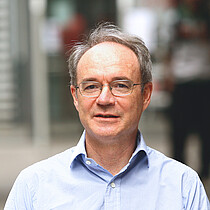

Interview: Thursday, 23 October 2025
In celebration of the university’s 112th anniversary at the Dies Natalis on 10 November 2025, Rotterdam School of Management, Erasmus University (RSM) will award an honorary doctorate to Prof. Patrick Bolton, Professor of Finance and Economics at Imperial College London, for his seminal contributions in the fields of contract theory, corporate finance, industrial organisation and climate finance. To mark the occasion, RSM will host the academic dialogue ‘Sustainable finance a decade after the Paris Agreement’ on 11 November featuring Prof. Patrick Bolton alongside Prof. Adair Morse and Prof. Dirk Schoenmaker. Ahead of the Dies Natalis, Prof. Bolton discussed the role of finance in addressing climate change with Moritz Wiedemann, Assistant Professor in RSM’s Department of Finance.

Imperial College London

Moritz Wiedemann: What sparked the focus on climate finance in your research?
Patrick Bolton: “In 2009 I was approached by Frédéric Samama about organising a conference on the topic of sovereign wealth funds (SWFs) and long-term investing. At the time Frédéric was working in New York for Amundi Asset Management, and had initiated the creation of a research chair on SWFs at University Paris Dauphine. I had done research on short-termism in speculative markets with José Scheinkman and Wei Xiong, which was indirectly about long-term investing, and was interested in pursuing this topic further. I was also interested in finding out about the SWF universe.
“Frédéric and I spent the best part of a year organising a three-day conference at Columbia University together with Joseph Stiglitz. It quickly dawned on us that a long-term investor with a 50+ year horizon could not ignore climate change risk. What’s more, a long-term SWF that’s working for the welfare of a nation has a responsibility to invest in a sustainable way.
“We had invited Robert Litterman to the conference. He had just stepped down from his position as chief risk officer at Goldman Sachs, and he made a very powerful observation in his speech. He said financial crises arise because of underpricing of risk, which causes investors to take too much risk. And when it comes to climate change risk, the risk is not priced at all!
We had barely emerged from the global financial crisis of 2007-2009, and that statement was an eye-opening moment for me.”
Moritz Wiedemann: Ten years after the Paris Agreement, how do you assess the progress of the financial sector in addressing climate risks?
Patrick Bolton: “The Paris Agreement was a landmark agreement in multiple ways. One major innovation was that for the first time the financial sector was invited to participate at COP 21 as one of the parties through the Portfolio Decarbonization Coalition led by Mats Andersson (former CEO of pension fund AP4, who is one of my co-authors of the article Hedging Climate Risk).
“I mention this because in many ways there is a ‘before COP 21’ and an ‘after COP 21’ when it comes to the engagement of the financial sector with climate change.
“There has been huge progress since 2015. Perhaps the culmination point was COP 26 in Glasgow, with the creation of the Glasgow Financial Alliance for Net Zero. Since then, there has been a bit of a retreat, and since the re-election of Donald Trump there is an all-out attack by the US on any climate change mitigation action, including any action in the financial sector.
“Another major advance post-COP 21 has been the creation of the Network for Greening the Financial System. All of the US’s involvement in this has ceased since January [2025]. Therefore a major challenge for the global financial sector will be to pursue climate change action despite and against the US.”
Moritz Wiedemann: In one of your recent working papers (Corporate Responsibility and the Theory of the Firm), you highlight that firms operate in environments of inefficiency and incompleteness, where corporate responsibility is harder to enforce. What practical levers like regulation, consumer pressure or investor oversight do you believe are most effective to push firms toward corporate responsibility?
Patrick Bolton: “The first step is for corporate leaders and institutional investors to understand that they have a responsibility beyond the law and custom to operate in a sustainable way. The slower governments are in acting to address climate change, environmental protection, promote social justice, and protect human rights, the greater this responsibility.
“It is wrong to make profits from child labour, from human rights violations, and it is wrong to make profits by destroying the planet. This is common sense and is a first fundamental practical step.
“While corporations cannot be held responsible for nothing, they also cannot be held responsible for everything. Ultimately, it is a matter of where to draw the line, and the more sustainably you act, the better.
“It is also a matter of acting collectively, because this has a bigger impact. Alliances to stop relying on plastic, to stop using fossil fuels, to stop deforestation, to protect water and oceans, to develop the use of clean energy are practical steps that are immediately within reach.”
Moritz Wiedemann: As we mark Erasmus University Rotterdam’s 112th anniversary, this event reflects on the responsibility of academia. What role can universities and business schools play in shaping the next generation of leaders in sustainable finance?
Patrick Bolton: “A central question for business schools is: what is their purpose? What is the aspiration of a business school? It should not be how to make more money, or how to help graduating students to get rich. That should not be the aim.
“Rather, what business schools should aspire to is to help finding practical solutions to economic and social problems through a better understanding of society and the economy. And help the future corporate leaders find practical solutions to the major problems we are facing. If they get rich while doing this, that is all the better. But the primary goal should not be to make as much money as possible.”
Moritz Wiedemann: Looking ahead, what gives you optimism about the financial sector’s ability to contribute to a just and effective climate transition?
Patrick Bolton: “There is no solution to climate change without the financial sector. The path to net zero involves huge investments in green technology and clean energy. These investments can only be funded through the financial sector.
“So it is not really a matter of optimism; the continued involvement of the financial sector is a necessity. This is why climate finance is not another fad that will pass, to be replaced by the next fad – like fintech or crypto. It is here to stay and can only grow because it must.”

Science Communication and Media Officer
Rotterdam School of Management, Erasmus University (RSM) is one of Europe’s top-ranked business schools. RSM provides ground-breaking research and education furthering excellence in all aspects of management and is based in the international port city of Rotterdam – a vital nexus of business, logistics and trade. RSM’s primary focus is on developing business leaders with international careers who can become a force for positive change by carrying their innovative mindset into a sustainable future. Our first-class range of bachelor, master, MBA, PhD and executive programmes encourage them to become to become critical, creative, caring and collaborative thinkers and doers.
